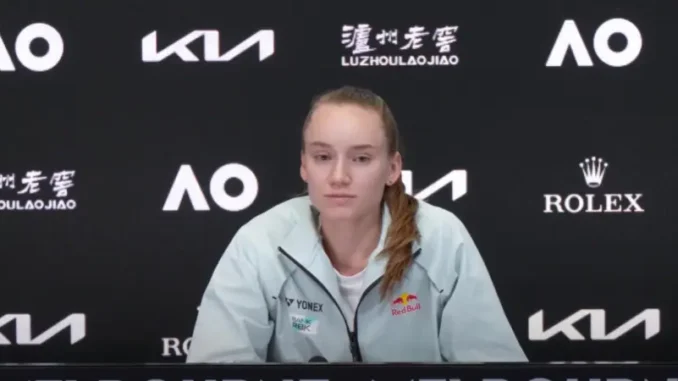
Elena Rybakina, one of the brightest stars in women’s tennis, has found herself at the center of an off-court controversy after a public disagreement with tennis commentator and former player Pam Shriver. The row began when Shriver made critical remarks about Rybakina’s coach, Stefano Vukov, during the Australian Open. Shriver’s comments suggested that Vukov’s courtside behavior was overly harsh and possibly detrimental to Rybakina’s performance and well-being.
However, Rybakina was quick to defend her coach, delivering a pointed response that left no room for ambiguity. The reigning Wimbledon champion publicly criticized Shriver’s remarks, stating emphatically, “You don’t know me,” and reinforcing her support for Vukov. This incident has sparked a broader debate about the boundaries of coaching, player autonomy, and the role of commentators in addressing such issues.
The controversy unfolded during Rybakina’s impressive run at the Australian Open, where she reached the final and reaffirmed her status as one of the game’s elite players. Shriver, who has a long history in the sport as both a player and a commentator, expressed concern over Vukov’s courtside demeanor during Rybakina’s matches. According to Shriver, the coach’s behavior appeared overly intense, and she questioned whether it was the right approach for a player of Rybakina’s caliber.
Shriver’s comments, made during a broadcast, quickly gained traction on social media and sparked discussions among fans and analysts. Some agreed with Shriver’s perspective, arguing that coaches should maintain a supportive and composed presence during matches, especially in high-stress situations like a Grand Slam. Others felt that the criticism was unwarranted and dismissed it as an overreach into the player-coach dynamic.
Rybakina’s response to Shriver was both direct and unwavering. Speaking to reporters, she made it clear that she fully trusts Vukov and values his approach to coaching. “Stefano has been with me through every step of my journey,” she said. “He knows me better than anyone else on tour, and I wouldn’t have achieved what I have without him. It’s easy to judge from the outside, but people don’t see the hard work and dedication behind the scenes.”
Her defense of Vukov was not just a personal statement but also a broader message about the importance of context and understanding in such discussions. Rybakina pointed out that every player-coach relationship is unique, and what works for one athlete may not work for another. She emphasized that Vukov’s intensity is a reflection of his passion for the sport and his desire to see her succeed, not a sign of negativity or disrespect.
The 23-year-old’s comments highlight a key issue in modern tennis: the scrutiny that players and their teams face, particularly during high-profile tournaments. In an era where every action is analyzed and dissected, the line between constructive criticism and unwarranted intrusion can often become blurred. For Rybakina, the debate over Vukov’s behavior seems to have added an unnecessary layer of distraction during what was otherwise a stellar tournament.
Rybakina’s loyalty to her coach is rooted in their shared history and success. Since teaming up with Vukov, the Kazakh star has enjoyed a meteoric rise, culminating in her maiden Grand Slam title at Wimbledon in 2022. Her powerful serve, aggressive baseline play, and calm demeanor on court have made her one of the most formidable players on the WTA Tour. Vukov’s coaching has undoubtedly played a crucial role in helping Rybakina unlock her potential and navigate the challenges of professional tennis.
For her part, Shriver has since clarified her comments, stating that her intention was not to undermine Rybakina or her achievements but to highlight what she perceived as an important issue in coaching dynamics. Shriver has been an advocate for player welfare throughout her career and has often spoken out about the pressures that athletes face, particularly young women in the sport. However, her remarks about Vukov have raised questions about the responsibilities of commentators when addressing such sensitive topics.
The incident also touches on a broader trend in tennis, where the behavior of coaches and other team members has come under increasing scrutiny. With the advent of on-court coaching and the growing visibility of players’ entourages, the interactions between players and their teams have become a focal point for fans and analysts alike. While this has brought greater transparency to the sport, it has also led to debates about the appropriateness of certain coaching methods and the impact they have on players.
For Rybakina, the experience serves as a reminder of the challenges that come with being a top player. As she continues to build her career and pursue further Grand Slam success, she will undoubtedly face more scrutiny and criticism. However, her resolute defense of Vukov suggests that she is well-equipped to handle these pressures and remain true to herself.
The young star’s handling of the situation has earned her praise from fans and fellow players, who admire her maturity and composure. By standing up for her coach, Rybakina has shown that she is not only a fierce competitor on the court but also a strong and independent individual off it. Her response to Shriver underscores her commitment to her team and her belief in the process that has brought her so much success.
As the tennis world moves on from this controversy, Rybakina’s focus will undoubtedly shift back to her game. With her talent, work ethic, and unwavering support from her team, she remains one of the brightest prospects in the sport. The incident with Shriver may have been an unexpected detour, but it has also provided an opportunity for Rybakina to reaffirm her identity and values—a testament to her growth as both a player and a person.
In the end, Elena Rybakina’s message was clear: she knows what’s best for her career, and she’s determined to chart her own path, regardless of outside opinions. Her journey, guided by trust and resilience, is one that fans will continue to watch with admiration and anticipation.
Leave a Reply